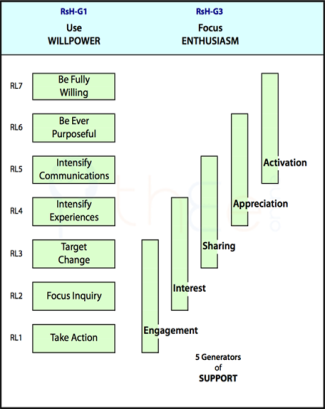Focus Enthusiasm: RsH-G3
Powering Virtuous Circles
You need support if you are to meet a genuine creatively.However, the most important support is the support you provide for yourself. And that comes from . The origin of the term![]() derives from the notion of being «inspired or possessed by a god».
derives from the notion of being «inspired or possessed by a god».
arises naturally: it energizes you and others to pursue activities. However, tends to diffuse over the whole and needs to be focused for optimum effect. When you you feel an inner support for particular relevant activities, even if you ordinarily would find them boring or unpleasant. Although may seem weak, in that it can rather easily wax and wane, it is contagious and lends itself to relatively easy activation.

The function of this Grouping is to energize yourself and others to pursue activities relevant to meeting your . You and others must feel that your particular way of addressing your is worthwhile. leads you to work hard in your chosen way. When others are enthusiastic and provide inputs, they confirm the value of what you are doing. There should be a virtuous circle: the more you support them, the more they support you.
However, you cannot just spray enthusiasm around. If you do it will have little effect. You cannot even blindly follow your own enthusiasms. If you do, you will end up being activated to little point and engaged in something that sooner rather than later becomes boring or irrelevant to your goals.
The quality that is called for here is shrewdness. You must somehow ensure that whatever you do fits in a viable way with your own experiences, relevant individuals, the situation or activities that forward the creative effort. That takes a mix of insight, understanding, ability to predict, and nous.
Addition of a 3rd adjacent Level of () contributes this shrewd quality, and reveals 5 (Triads: ) as follows:
Enthusiasm's Methods and Rationales
bolsters the energies already released by and provides the push for social activities. You cannot proceed effectively without it. Others who are under no obligation to be concerned with your personal need to feel your enthusiasm in order to respond. Who you choose to involve, and how, is up to you.
- In the transcendental Triad, in regard to the most important aspects of your project is how enthusiasm is most commonly perceived. Such support is general.
Naturally, you will be more activated if others are activated.
- provides for interpersonal exchanges of support.
Such appreciation, especially if mutual, sustains self-esteem and well-being.
- In the Triad centred on , support comes from intrapersonal feelings. It is obtained by certain details of what is going on in your project.
Sharing can be just one-way (e.g. with an advisor) but it often feels better when it is mutual, especially if it is a friend or colleague.
- in the project may lead them to make a limited contribution.
Your interest in another's interests leads to their interest in your interests.
- In the actualization Triad, the goal is to with the , so that there will be direct, ongoing, practical efforts to meet the .
When another is engaged in your project, you must engage with them and their efforts and outcomes, which further supports their engagement.
- Now, look more closely at each generator of support.
Originally posted: 31-Jan-2012